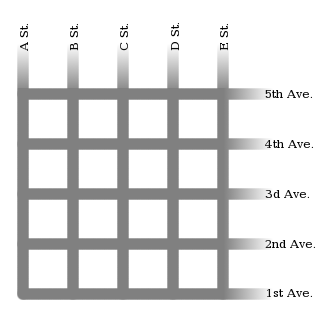I watched a movie and heard the following sentence:
Skeeter: I parked way up on State Street and caught a cab here, like you asked.
Aibileen : Got dropped two streets over?
If there is a situation like the below picture illustrates (A,B,C,D,E are the streets) - in the phrase 'two streets over', what is the exact meaning of 'over'?
Is the meaning that Skeeter got out of the taxi on A street or E street? I am wondering what is the context of 'over'? Could between, before or passing, replace the word 'over'?


